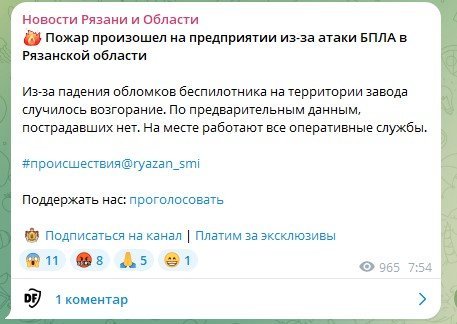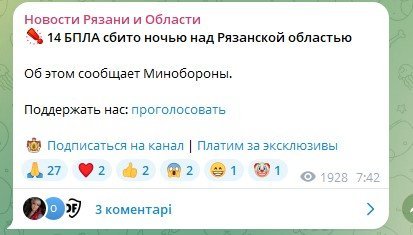Ryazan attacked by UAVs: explosions and fire at enterprise. VIDEO&PHOTOS
On the night of 23 October, a series of explosions occurred in the Russian city of Ryazan, caused, according to local residents, by a drone attack.
According to Censor.NET, this was reported by Russian telegram channels.
According to the Shot Telegram channel, at least 10 explosions were heard over Ryazan. The sounds of explosions were also heard in the city of Skopin, Ryazan region.
According to locals, explosions were heard on the outskirts of Ryazan at around 3:15 a.m., and later in Skopin. After that, a fire broke out. Officially, Russia says that "air defence systems were triggered by drones". There was no information about casualties or damage.
Local telegram channels, in turn, report that a fire broke out on the territory of one of the enterprises as a result of the drone attack. Other media outlets report that access to the refinery is closed.
According to the Russian Ministry of Defence, 14 Ukrainian drones were allegedly shot down over the Ryazan region.
Ryazan refinery: what is known
The Ryazan Oil Refinery, one of Russia's key oil infrastructure facilities, has been the target of numerous attacks by Ukrainian unmanned aerial vehicles (UAVs) since the beginning of 2025. These strikes are aimed at reducing Russia's ability to supply fuel and affect its economic stability.
This is not the first time the company has been targeted by Ukrainian forces. In March 2024, several drones attacked the refinery. One of the drones hit the primary refining unit, causing a massive fire. The attack resulted in the burning of a heat exchanger unit.
The next attack on the refinery took place on the night of 1 May 2024.
In 2025, the Ryazan refinery was attacked by drones at least five times. In particular, on the night of 24 January. The attack set fire to at least 3 tanks and a workshop with a diesel and jet fuel hydrotreatment unit. Locals reported more than 50 explosions.
It was noted that the attack on the Ryazan Oil Refinery and the Ryazan CHP was organised by the SBU and the Special Operations Forces.
On the night of 26 January, explosions were heard again near the refinery .
The next attack on the refinery took place in February. A fire broke out on the territory of the enterprise. Eyewitnesses reported hearing a series of loud explosions near the refinery and later seeing flames on the plant's premises.
On the night of 29 April, drones again attempted to strike the Ryazan refinery.
In May, it became known that the Ryazan Oil Refinery had cut about half of its refining capacity after an attack by Ukrainian drones.
On the night of 5 September 2025, units of the Unmanned Systems Forces, the Special Operations Forces of the Armed Forces of Ukraine, the Defence Intelligence of Ukraine, in cooperation with other components of the Defence Forces, attacked the Ryazan Oil Refinery .
The attacks on the Ryazan refinery have a significant impact on Russia's oil infrastructure:
-
Fires and production stoppages: Strikes lead to large-scale fires and temporary shutdowns of production facilities, affecting Russia's ability to refine oil.
-
Reduced fuel exports: Damage to refineries limits Russia's ability to supply fuel, which could lead to fuel shortages in the domestic market and reduced export revenues.
-
Psychological impact: These attacks demonstrate Ukraine's ability to achieve strategic goals on Russian territory, which has a moral and psychological effect on the population and military.
Ukraine's strikes on Russian targets in autumn 2025
Since September 2025, Ukraine has significantly intensified its attacks on infrastructure in Russia, including energy facilities (oil refineries, oil pipelines, hubs), military/defence enterprises, and infrastructure nodes. This is a combination of drone strikes and long-range missiles.
On 20 September 2025, a series of strikes were carried out on energy facilities in the Russian Federation (Samara, Saratov, etc.). Ukrainian drones hit several energy infrastructure facilities in the Samara and Saratov regions.
At the end of September, strikes were reported on refineries, tanks, and pumping stations in the regions of the Russian Federation, causing local fuel shortages and disrupting exports
In October, Ukraine struck at energy and defence enterprises in Russia


